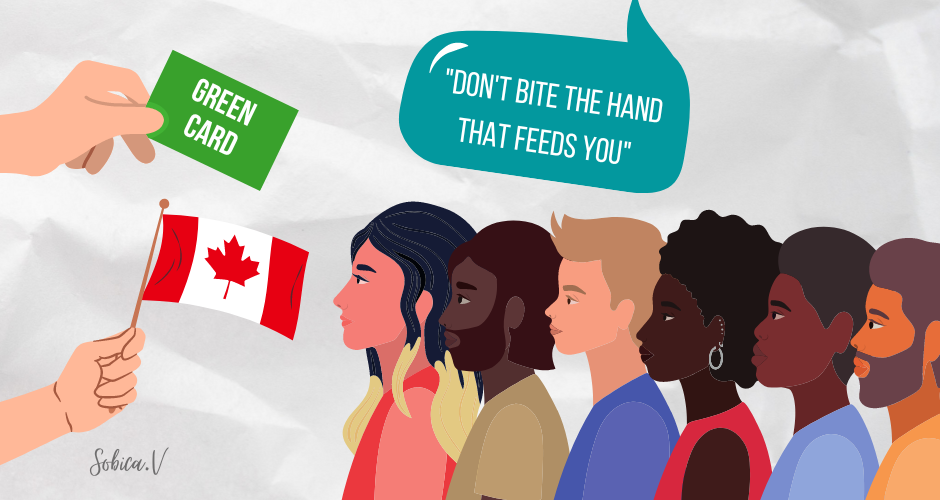
Date on your own terms! myTamilDate.com has been the most trusted dating community for single Tamils around the world for close to a decade! We’re the premiere dating site for diaspora Tamils and have the largest membership base in Canada, USA, UK & more.
Get to know our other success stories here.
____
“Be grateful for what you have” is probably something all first-generation immigrant Canadians (and immigrants all over the world) have heard at some point. Maybe you have heard it from family. But sometimes, it doesn’t come from those immediately around us. It is also a message that is often pushed by right-leaning media. It is the idea that immigrants and refugees owe everything – their lives, education, jobs, food, their children’s success, their wealth and all achievements to their adoptive countries. It is also an idea that reveals an interesting double standard that is worth discussing.
The idea that immigrants, and children of immigrants, must kneel in gratitude is a very prevalent one. It was most clearly demonstrated in 2019 in the US, when US Congresswoman Ilhan Omar was criticised for condemning Trump’s various policies which, as a congresswoman, are her job to point out and address. The critiques levelled at her, aside from calls for her to “go back to where she came from,” were at her apparent nerve to criticise the country that had both saved her and had so selflessly allowed her the privilege of being an elected leader.
Sure, looking at Omar, or any immigrant or refugee, it is true that none of us would be where we are if the country we came to had not let us in, whether it be Canada, the US, the UK, Australia, India or Germany. But how many of our accomplishments are we supposed to credit to the country we came to? When does it stop? At what point are our accomplishments and lifestyles a result of our own hard work, rather than gifts granted to us?
We all know the immigrant stereotype: immigrants don’t disturb the status quo; they keep their heads down and work hard. Asian immigrants are famously stereotyped for being “good, hard-working citizens” who don’t ask questions, but quietly appreciate the better lives they have been granted by their adoptive country. They don’t raise their voices; but if they do, they become ungrateful foreigners who should keep their mouths shut.
The most obvious issue here is the undeniably blatant racism underpinning these ideas. You can’t ignore the fact that these comments are always directed at people of colour, even those born in the very countries they critique. French-born-and-raised politician Carlos Martens Bilongo was just a few weeks ago told to “go back to Africa” in France’s National Assembly. US Congresswomen Alexandria Ocasio-Cortez, Rashida Tlaib and Ayanna Pressley are all US-born, but have also been told to “go back to where they came from”. While native-born, they must clearly be thanking the countries they were born in rather than complaining about them. Interestingly, however, when their White colleagues – almost all of whom can trace their roots to Germany, the UK, Ireland, Italy, France, Spain and the rest of Europe – are equally vocal about social and structural issues in America, there is no such backlash. It would seem that they have earned their right to complain by working hard and earning their place in American society; there’s no need for them to thank America for granting their ancestors safe haven. Their non-White colleagues, on the other hand, need to check their privileges it seems.
____
Network & collaborate with Tamil Changemakers from around the world. Request to join our private LinkedIn community here.
____
It is worth mentioning that depending on where we live, our adoptive countries may have created the circumstances that forced us to leave in the first place. There’s an undeniable sad irony in Sri Lankan Tamils forced to flee to the UK for safety, Algerians forced to flee to France, or Iranians and Vietnamese forced to relocate to the US. For those who now live in the very countries that upended their once-peaceful homes, feelings of gratitude may be mixed.
The next issue here is that it forever keeps visible minorities separate; by saying that immigrants and descendants of immigrants are only welcome if they keep quiet, they will always be seen as “others” (which is the whole point of this type of rhetoric anyways, so maybe I’m stating the obvious).
The last issue – it completely negates individual ability and accomplishments. At what point do our accomplishments become our own? How far back do we go in thanking the country in which we live for allowing our European, Asian, African, and South American ancestors in? An interesting element of countries like Canada, the US and Australia, among others, is that their non-First Nations inhabitants all came from somewhere else in very recent times. Surely at some point, we can credit our achievements to hard work, intelligence, hustle and those around us, as well as to the countries and governments that accepted us.
As immigrants, we can be grateful for what our adoptive countries have provided, whichever country that may be. But you can also advocate for more, ask for a raise, ask tough questions, and criticise imperfect systems. You have that right just as anyone else. I am not saying that everyone must be loud and critical; individuals whose immigrant status is in limbo, or those on temporary visas may feel a sense of fear in taking bold positions, while others may simply not want to. But no one has the right to tell you to be quiet just because you’re an immigrant, to bow your head in perpetuity, to not “bite the hand that feeds you.”
My gratitude to Canada definitely exists. I’m happy to be here. Being in Canada has allowed me good health, stability, and more. But my career achievements, my relationships, privileges and personality also came from my own hard work and the opportunities provided by those around me, and the opportunities I created. I thank myself, my friends, family and network, as well as Canada. I’m sure Justin Trudeau doesn’t credit his success to the Canadian government for allowing his French ancestors into the country; I doubt Donald Trump credits his wealth to America for giving his German grandfather a new home. And they shouldn’t need to. And neither should you.
Sources

Our MTD couple was captured by our UK photography partner Photon Image by Daran.

























